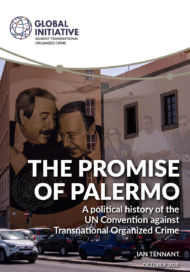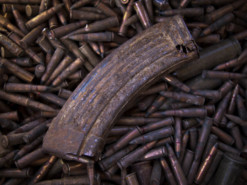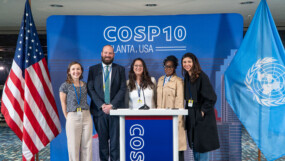Posted on 12 Oct 2020
As the UN turns 75, the General Assembly’s organized-crime agenda continues but is overshadowed by the pandemic.
The 75th United Nations General Assembly has begun in a changed world. Due to the coronavirus pandemic, what was planned as a significant anniversary has become a remote-working event for most – including world leaders.
Further, what should have been a major celebration of multilateralism has been tinged by nationalist responses to the pandemic and heightened animosity among world leaders and the P5 countries (China, France, Russia, the United Kingdom and the United States). In his address to the assembly, Secretary-General António Guterres warned again that global geo-strategic tensions are at the highest level in years, drawing a contrast between the state of the world and the ambitions set forth in this year’s Declaration on the commemoration of the seventy-fifth anniversary of the United Nations. As demonstrated by the 24 September Security Council meeting concerning post-COVID-19 global governance, discord among member states remains high.
The pandemic has also limited the role of the General Assembly as a place for broader policy debate. The beginning of a new calendar year for the General Assembly gives a platform to world leaders to share their priorities, grievances and expectations, but it is also usually a time when stakeholders and civil society arrive in New York, share their expertise with delegates and one another and connect to ongoing policy debates. The pandemic has largely shut off this space: while civil society continues to engage through virtual side events, the benefits of exchanging ideas on the margins of formal meetings have been lost.
Although public attention is currently distracted elsewhere (for understandable reasons), policymaking is nevertheless underway. Below is a brief overview of the transnational organized-crime (TOC) issues on the agenda during this year’s session to keep our Network of Experts and our readers updated on what’s going on in New York.
The Third Committee’s TOC agenda
The committees of the General Assembly opened their 75th session in the first week of October. Each committee takes on different aspects of the organization’s mandate and passes resolutions that instruct the work of the UN. Most TOC issues are handled by the Third Committee on Social, Humanitarian and Cultural Issues, but some are discussed in other committees. (Illicit financial flows, for example, are addressed in the Second Committee on Economic and Financial issues, and illicit arms trafficking in the First Committee on Disarmament and International Security.)
The Third Committee advances and approves resolutions passed by UN crime bodies primarily located in Vienna, such as the Commission on Crime Prevention and Criminal Justice. However, issues can be added to the committee’s agenda when a member state or group of states seek to move an issue forward through New York rather than Vienna. The Third Committee also negotiates its own resolution on drug policy each year (known as the omnibus resolution on the world drug problem), as well as on issues of crime and criminal justice.
This year’s Third Committee general debate on crime took place virtually on 8 October. Some member states used the opportunity to recognize the impact that the coronavirus pandemic has had on organized criminal activity, with Indonesia calling for more research on the topic. Italy announced its intention to submit a proposal for the crime omnibus resolution, and also took note (along with Colombia) of the upcoming Conference of the Parties to the UN’s convention on TOC this month, and the finalization of the convention’s review mechanism. The dominant topic of the debate, however, was the cybercrime-convention deliberations.
Cybercrime
This year, the committee was meant to carry forward a process initiated in 2019 by Russia in Third Committee and approved by the General Assembly to consider a UN cybercrime convention. The initial resolution called for the establishment of an ad hoc intergovernmental committee of experts to convene and establish procedural rules ahead of the 2020 General Assembly, but the process was delayed. Russia announced during the general debate that it does not plan to submit a new resolution during this year’s Third Committee.
The 2019 resolution faced European and US opposition from the beginning, and disagreements over how and where to negotiate a cybercrime treaty were the main topic at the 8 October general debate. The current political fight hinges on whether the process will take place in New York, which makes decisions by vote, or in Vienna, which makes decisions by consensus.
The EU, UK, Japan, Czech Republic and Austria all called for the ad hoc committee to be placed in Vienna, under consensus-based decision-making. Russia, on the other hand, voiced support for New York, and noted that the resolution called for an organizational session in New York. However, both Russia and states in support of Vienna suggested that advances in communication technology during the pandemic could help facilitate an inclusive process by providing access to states virtually.
These debates over procedure will continue into next year, with a meeting at the end of January 2021 in New York to address the configuration of the ad hoc committee and its leadership, and the procedural rules themselves are now expected to be determined by delegates in Vienna by March 2021.
International drug control
The Third Committee’s omnibus resolution on drugs is a second venue for the ongoing debates on what global drug policy is meant to achieve. Some states use this space – which reaches agreement by vote rather than consensus – to include language and issues that are often stifled in Vienna. For instance, Mexico, which steers the resolution, used the general debate to reiterate its support for a public-health and human-rights approach to drug policy, an ongoing point of contention among groups of states.
However, given the difficulties of negotiating during the pandemic, Mexico will submit last year’s resolution and only suggest technical updates. It is possible, though, that this could include language on COVID-19 given the central role of the pandemic during 2020.
Faced with significant operational and political challenges, many states are using their political capital on pandemic-related issues. This means that in other areas (such as TOC), most states will likely opt to go through the motions and not make waves as the committees get underway. But there is always a possibility that some states may engage in strategic manoeuvring if they perceive an opportunity.



